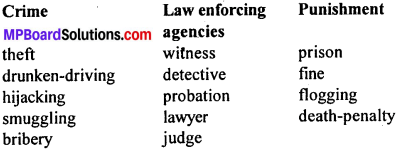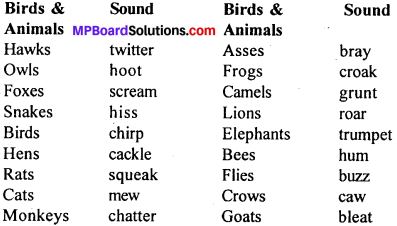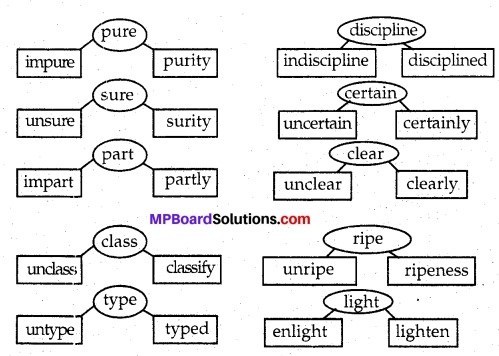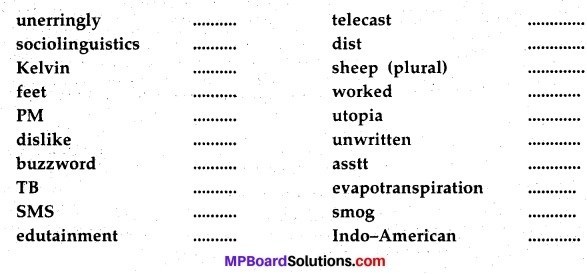MP Board Solutions for 12th Textbook General English The Spectrum Solutions Chapter 13 Forest and River Questions and Answers aids you to prepare all the topics in it effectively. You need not worry about the accuracy of the Madhya Pradesh Board Solutions for 12th English as they are given adhering to the latest exam pattern and syllabus guidelines.
You Can Download MP Board Class 12th English Solutions Questions and Answers Notes, Summary, Lessons: Pronunciation, Translation, Word Meanings, Textual Exercises. Enhance your subject knowledge by preparing from the Chapterwise MP Board Solutions for 12th English and clarify your doubts on the corresponding topics.
MP Board Class 12th English The Spectrum Solutions Chapter 13 Forest and River (Jalaluddin Rumi)
Kick start your preparation by using our online resource MP Board Solutions for 12th English Chapter 13 Forest and River Questions and Answers. You can even download the Madhya Pradesh Board Class 12th English Solutions Questions and Answers for free of cost through the direct links available on our page. Clear your queries and understand the concept behind them in a simple manner. Simply tap on the concept you wish to prepare in the chapter and go through it.
Forest And River Exercises From The Text-Book
Comprehension
निम्नलिखित प्रश्नों के उत्तर दीजिए-
Question 1.
Why does the forest envy the river? [2009, 18]
जंगल नदी से ईर्ष्या क्यों रखता है?
Answer:
The forest envies the freedom of movement that the river enjoys and regrets its own destiny of remaining chained to one place.
जंगल नदी को प्राप्त घूमने की आजादी से ईर्ष्या रखता है और एक स्थान पर बँधकर रहने की अपनी तकदीर पर तश्चाताप करता है।
Question 2.
What is the kingdom of water?
जल का साम्राज्य क्या है?
Answer:
The sea is the kingdom of water. जल का साम्राज्य समुद्र में है।
Question 3.
What is the forest’s complaint about its life? [2009]
अपने जीवन के विषय में जंगल की क्या शिकायत है?
Answer:
The forest regrets its own destiny of remaining chained to one place. It complains that it grows old in silence and die.
जंगल एक स्थान पर बँधकर रहने के अपने भाग्य पर पश्चाताप व्यक्त करता है। उसे शिकायत है कि वह इसी प्रकार शान्त रहकर बूढ़ा हो जायेगा और मर जायेगा।
Question 4.
How does the river praise the forest? [2012]
नदी जंगल की प्रशंसा किस प्रकार करती है?
Answer:
The river praises the majestic seclusion that the forest enjoys. It praises the calm and rest gifted to the forest.
नदी जंगल को प्राप्त भव्य एकाकीपन की प्रशंसा करती है। वह जंगल को प्राप्त शान्ति व विश्राम की भी प्रशंसा करती है।
Question 5.
Why does the river consider its journey meaningless? [2009]
नदी अपनी यात्रा को व्यर्थ क्यों मानती है?
Answer:
The river considers its journey meaningless because it always runs and runs and never has a moment of calm and rest.
नदी अपनी यात्रा को व्यर्थ मानती है क्योंकि यह सदैव चलती और चलती रहती है और कभी भी शान्ति व विश्राम का क्षण प्राप्त नहीं कर पाती।
Question 6.
In what way does the dialogue between the river and the forest reflect the dilemma of a passer-by?
नदी व जंगल के मध्य का वार्तालाप किस प्रकार पास से गुजरने वाले एक व्यक्ति की दुविधा को दर्शाता है?
Answer:
The dialogue between the river and the forest beautifully reflects the dilemma of a passerby. He is not able to decide as to which course of life he should choose. The freedom of movement that the river enjoys on the majestic seclusion, calm and rest that the forest enjoys.
नदी व जंगल के मध्य का वार्तालाप पास से गुजरने वाले व्यक्ति की दुविधा को खूबसूरती से दर्शाता है। वह यह निर्णय लेने की स्थिति में नहीं है कि उसे जीवन में कौन-सा मार्गदर्शन अपनाना चाहिए-नदी द्वारा उठायी जाने वाली स्वतन्त्रता का आनन्द अथवा जंगल द्वारा उठाये जाने वाले एकाकीपन, शान्ति एवं विश्राम का आनन्द।
Forest And River Summary
– Jalaluddin Runi
यह प्राकृतिक नियम है कि दूसरों का जीवन व दूसरों की स्थितियाँ हमें स्वयं से बेहतर लगती हैं। जंगल, नदी द्वारा आनन्द उठायी जा रही स्वतन्त्रता से प्रतिद्वन्द्विता महसूस करता है और अपने भाग्य पर पश्चाताप करता है कि वह एक ही स्थान पर बँधे रहने के लिए विवश है। दूसरी तरफ नदी यह महसूस करती है कि जंगल द्वारा उठाया जा रहा एकाकीपन का आनन्द उसकी निरन्तर बहने वाली स्वतन्त्रता से बेहतर है। उसे महसूस होता है कि उसकी यात्रा व्यर्थ है। नदी चाहती है कि जंगल को प्राप्त शान्ति एवं विश्राम उसे भी सुलभ हो सके। इस प्रकार नदी एवं जंगल एक दूसरे की स्थितियों की तुलना करते हैं और अपनी स्थिति से दूसरे की स्थिति बेहतर मानते हैं। यह प्रश्न मनुष्य के हृदय में भी उठता है कि उसे किस प्रकार का जीवन जीना चाहिए जंगल का या नदी का?
We believe the information shared regarding MP Board Solutions for 12th English Chapter 13 Forest and River Questions and Answers as far as our knowledge is concerned is true and reliable. In case of any queries or suggestions do leave us your feedback and our team will guide you at the soonest possibility. Bookmark our site to avail latest updates on several state board Solutions at your fingertips.




